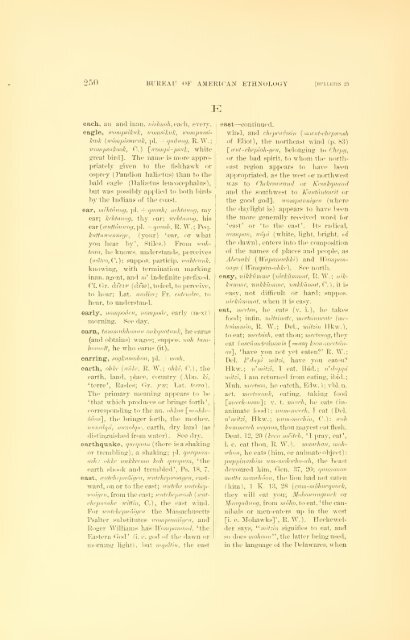Untitled - Smithsonian Institution
Untitled - Smithsonian Institution
Untitled - Smithsonian Institution
You also want an ePaper? Increase the reach of your titles
YUMPU automatically turns print PDFs into web optimized ePapers that Google loves.
250 BUREAU OF AMERICAN ETHNOLOGY<br />
each, an and inan. nuhnoh, each, every,<br />
eagle, trompsiknk, u'omsikiil; wom]m,isikmk<br />
(wompissacuk, pi. -]rquduog,'R.'W .;<br />
woinpsnkook, C. ) [^irompi - psuk, white<br />
great bird]. The name is more appro-<br />
priately given to the fishhawk or<br />
osprey (Pandion halifetus) than to the<br />
bald eagle (Halisetns leucocephalus),<br />
but was possibly applied to both birds<br />
by the Indians of the coast,<br />
ear, inilitdnorj, pi. -^ quash; nehtauoff, my<br />
ear; kehtnnng, thy ear; wehtauog, his<br />
eB,r(v)utt6uwog,^\. -j-quaxh, R. W.; Peq.<br />
kuttuwavnege, (your) 'ear, or what<br />
you hear by', Stiles.) From vah-<br />
tenv, he knows, understands, perceives<br />
(?('(f ?co, C ; ) suppos. particip. vvihtennk,<br />
knowing, with termination marking<br />
inan. agent, and m' indefinite prefixed.<br />
Cf. Or. afsiv (aim), to feel, to perceive,<br />
to hear; Lat. audire; Fr. entendre, to<br />
hear, to understand.<br />
early, iiompodeu, vomjini'if, early (next)<br />
morning. See day.<br />
earn, tummuhhfmwi onkquatunk, he earns<br />
(and obtains) wages;. suppos. iioh iam-<br />
hmiiidt, he who earns (it).<br />
earring, sogkunmhou, pi. -j-yuish.<br />
earth, ohke {afike. E. W.; ohke, C), the<br />
earth, land, place, country (Ahn. ki,<br />
'terre', Rasles; Gr. yyj; Lat. terra).<br />
The primary meaning appears to be<br />
'that which produces or brings forth',<br />
corresponding to the an. ohkas l=(ihke-<br />
Odas}, the bringer forth, the mother.<br />
nunahpd, nunohpe, earth, dry land (as<br />
distinguished from water) . See dry.<br />
earthquake, qveqvan (there is a shaking<br />
or trembling), a shaking; pi. qiieqiian-<br />
ash : olike inikkeemo koh qiieqnan, 'the<br />
earth shook and trembled', Ps. 18, 7.<br />
east, inHchepv.'6iyeu, imitchepiroayeii, eastward,<br />
on or to the east; iimtehe wutchep-<br />
ii'oii/eti, from the east; irutchejivosh ( umt-<br />
chepwoshe udttin, C), the east wind.<br />
For toutehepwoijfeu the Massachusetts<br />
Psalter substitutes vompanniyeii, and<br />
Roger Williams has Wompanavd, 'the<br />
Eastern Ood' (i. e. god of the dawn or<br />
mornnig light), but iiopdiiii. the east<br />
E<br />
east—continued.<br />
wind, and rliepenrmn { = inil-riiepjir(ish<br />
of Eliot), the northeast wind (p. 83)<br />
liftit-chepioh-ijeit, belonging to Chejty,<br />
or the bad spirit, to whom the northeast<br />
region appears to liave been<br />
appropriated, as the west or northwest<br />
was to Chfkesiw;and or Kisukqnaml<br />
and the southwest to Kaufi'inlo>rit or<br />
the good god], immpannii/en (where<br />
the daylight is) appears to have been<br />
the more generally received word for<br />
'east' or 'to the east'. Its radical,<br />
wompan, irdpi (white, light, bright, of<br />
the dawn) , enters into the composition<br />
of the names of places and people, as<br />
Abenaki. ( ]Vapanachki) and Wampan-<br />
nag.i ( Wampan-ohke) . See north.<br />
easy, 7iikk&mme {nickuminat, R. AV.; nikknmme,<br />
nukkumme, ?mH*rt/no/, C), it is<br />
easy, not difficult or hard; suppos.<br />
nirkihnmat, when it is easy.<br />
eat, meetsti, he eats (v. i. ), he takes<br />
food; infin. metsinate, meetsimieate {vtetesimmhi,<br />
'R. W. ; Del., mitzin Hkw.),<br />
to eat; meet/fish, eat thon; meetfiHog, they<br />
eat (ascAmetedmmis [=n,

















